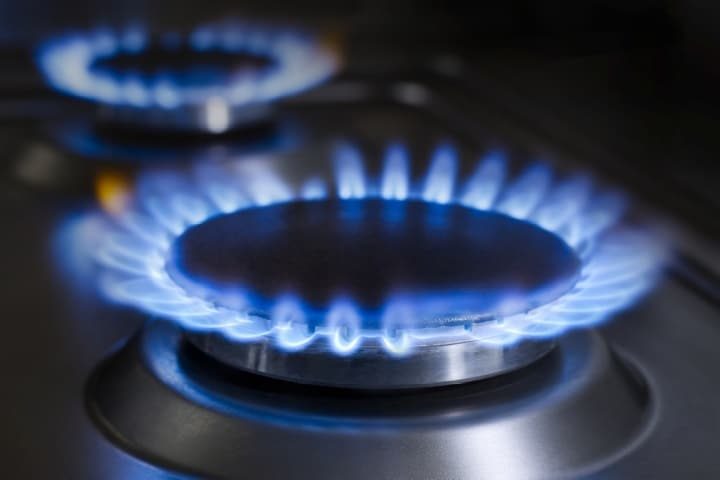
Germany will have to bear with further limitations in gas consumption or experience a grave gas shortage next winter, the nation’s Gas Storage Association (INES) cautioned on Wednesday, April 19.
The INES report pointed out that current measures require German gas storages to be filled to only 40 percent by the end of January 2024, permitting the country to weather through the next winter “if temperatures are warm.” The report then elaborated that “if temperatures are medium to cold, the gas storage facilities will be heavily or completely emptied.”
At the very worst, the storage facilities will be “already completely emptied in January 2024 during cold temperatures,” the forecast predicted, highlighting that Berlin would likely be unable to make up for missing volumes, thus facing a grave shortage for the remainder of the winter.
“Looking ahead to the coming winter, gas supply security in Germany has not yet been restored,” the INES managing director, Sebastian Bleschke, warned. “It is crucial to fill the gas storage facilities and greatly reduce consumption when it gets cold,” he maintained.
Moreover, Bleschke urged German gas infrastructure to expand to “be activated at short notice and actually provide additional gas in the coming winter.”
Notably, the INES forecast portrayed “warm winter temperatures” such as those experienced in the Baltic Sea region, Finland, and Western Russia in 2020, when temperatures rose up to eight degrees Celsius warmer than on average.
Also, the report premised a “cold winter” scenario on the 2010-2011 winter season in Europe that witnessed historic cold temperatures in Ireland, France, the U.K., and parts of Scandinavia.
Together with other EU member states, Germany has been slowly decreasing its dependence on Russian energy supplies since the start of the Russo-Ukraine conflict in February 2022.
Last month, Klaus Müller, head of Germany’s Federal Network Agency (the Bundesnetzagentur) told the Rheinische Post that his country faced a potential energy crisis in the upcoming winter.
At the time of his interview, Müller asserted that Germany’s gas storage facilities were then 64-percent full, and that German energy supply for the remainder of this winter season was guaranteed. Nonetheless, he added that “we should not relax, as things could be different next winter.”
“We cannot rule out a gas shortage for next winter. Risk factors are that the winter of 2023/24 will be very cold, that households and companies will save too little, that the LNG terminals will not work as planned — we would also have to help our neighboring countries with their energy problems,” Müller stated, pointing out that with regard to the upcoming winter and heating season, the weather would be the largest risk factor.
“We cannot rely on the fact that next winter will be mild again. When it’s cold, many households immediately stop saving. In warm October they saved more than 20% of gas, while during the cold snap in December — only 7%.”
Besides, Müller mentioned that Germany’s upcoming heating season would be vulnerable due to a lack of Russian energy supplies, the latter which enabled the country to fill up storage tanks for last year’s heating season.
Although the EU did not explicitly forbid Russian pipeline gas imports, gas flows nevertheless dropped considerably owing to Ukraine-related sanctions and the alleged American sabotage of the Nord Stream 1 pipeline, one of the key routes for Russian gas to Europe.
Consequently, Germany no longer procures Russian gas directly, and the era of cheap energy prices from Russia is over, Müller contended.
“We don’t know what will become of Russia’s remaining gas supplies…. We have to get used to higher prices, the time of cheap energy from Russia is definitely over,” he warned.
For the record, gas prices have been relatively low throughout Germany’s recent winter season, owing to mild weather and lower demand. Despite skyrocketing to over €300 per megawatt hour late last summer, wholesale gas prices dropped to around €50 in March. While €50 greatly exceeds what natural gas cost in early 2021, such a price has become “the new normal,” Müller remarked, indicating that consumers would have to continue conserving energy to prevent future price hikes.
However, what Müller omitted was the Western provocative actions and prolonging of the Russo-Ukraine conflict as well as the associated impacts of anti-Russian sanctions on soaring energy prices in Germany and the rest of Europe.
In contrast to the energy shortage that Germany has been facing for the past year, Russian multinational energy corporation Gazprom stated on April 20 that Russia’s natural gas reserves would last for a century.
Viktor Zubkov, chairman of Gazprom’s board of directors, told his audience at an industry forum in Moscow that as of the end of last year, the company had 35 trillion cubic meters of proved natural gas reserves.
After the United States, Russia is the world’s second-largest producer of natural gas, and has the world’s largest reserves. Furthermore, Gazprom has a 15 percent share of global gas stocks.
Last month, Gazprom claimed that it has discovered more natural gas yearly than it has extracted for 18 years consecutively. In 2022, Russian reserves increased by almost 530 billion cubic meters, with an overall production figure at 412 billion cubic meters.
Owing to Western-led sanctions against Russia and resulting supply disruptions, Gazprom had to reduce gas production last year by nearly 20 percent. The EU, hitherto Gazprom’s largest customer, dramatically decreased long-distance exports of pipeline gas by about 45 percent, based on Gazprom data. Since then, Russia has redirected supplies to other countries such as China.
On April 20, the Financial Times (FT) reported that the EU has run out of options for more sanctions against Russia, citing EU officials.
FT asserted that the EU has thus far implemented 10 rounds of sanctions and is presently preparing an 11th package of penalties against Moscow, adding that meetings between the European Commission and member state officials to discuss new actions were expected to begin on April 21.
EU officials involved in preparing the upcoming sanctions package told FR that restrictions are likely to only further impose travel bans and freeze the assets of targeted individuals, as well as to address loopholes in current measures.
Most officials allegedly acknowledged that those sectors of the Russian economy that were left unscathed by sanctions were essential areas that one or more EU member states “can’t live without.” In wake of this situation, officials would veto measures targeting these sectors.
“We are done,” one of the officials said, adding, “If we do more sanctions, there will be more exemptions than measures.”
New restrictions are purportedly expected to target Russia’s nuclear fuel and services exports, but EU member states such as Hungary and France could object to these measures.
While massive Western-led sanctions have been imposed on several sectors of the Russian economy as well as individuals and entities, prohibiting bilateral trade flows worth more than €135 billion ($148 billion), many analysts and politicians have posited that such embargoes harm Western countries more than Moscow.
Russian President Vladimir Putin has compared the EU’s efforts to deprive itself of Russian fossil fuels to economic “suicide.”
Echoing Putin, Hungarian President Viktor Orbán repeatedly slammed “the failed policy of Brussels” and stated that the sanctions “didn’t fulfill the hopes that were pinned on them,” while Europe is “slowly bleeding.”
Budapest has vehemently opposed proposals for more restrictions on Russian gas imports and has also pledged to object to any curbs on Russia’s nuclear energy industry, with Orbán even securing an exemption from EU sanctions on Russian crude oil imports.
To address Hungary’s energy woes as a result of EU-imposed sanctions, Hungarian Foreign Minister Péter Szijjártó declared earlier this month that his country reached an agreement with Gazprom on possible gas supplies, more than what is offered in long-term contracts.
Szijjártó’s announcement came after talks with Russian Deputy Prime Minister Aleksandr Novak and the CEO of Russian nuclear energy major Rosatom, Aleksey Likhachev.
“We managed to agree with Gazprom the possibility of buying supply volumes in excess of the amount indicated in the long-term contracts, if a need arises in the course of preparation for winter … mainly through the Turkish Stream [pipeline],” Szijjártó said.
“Today we extended the agreements regarding this possibility,” he added.



